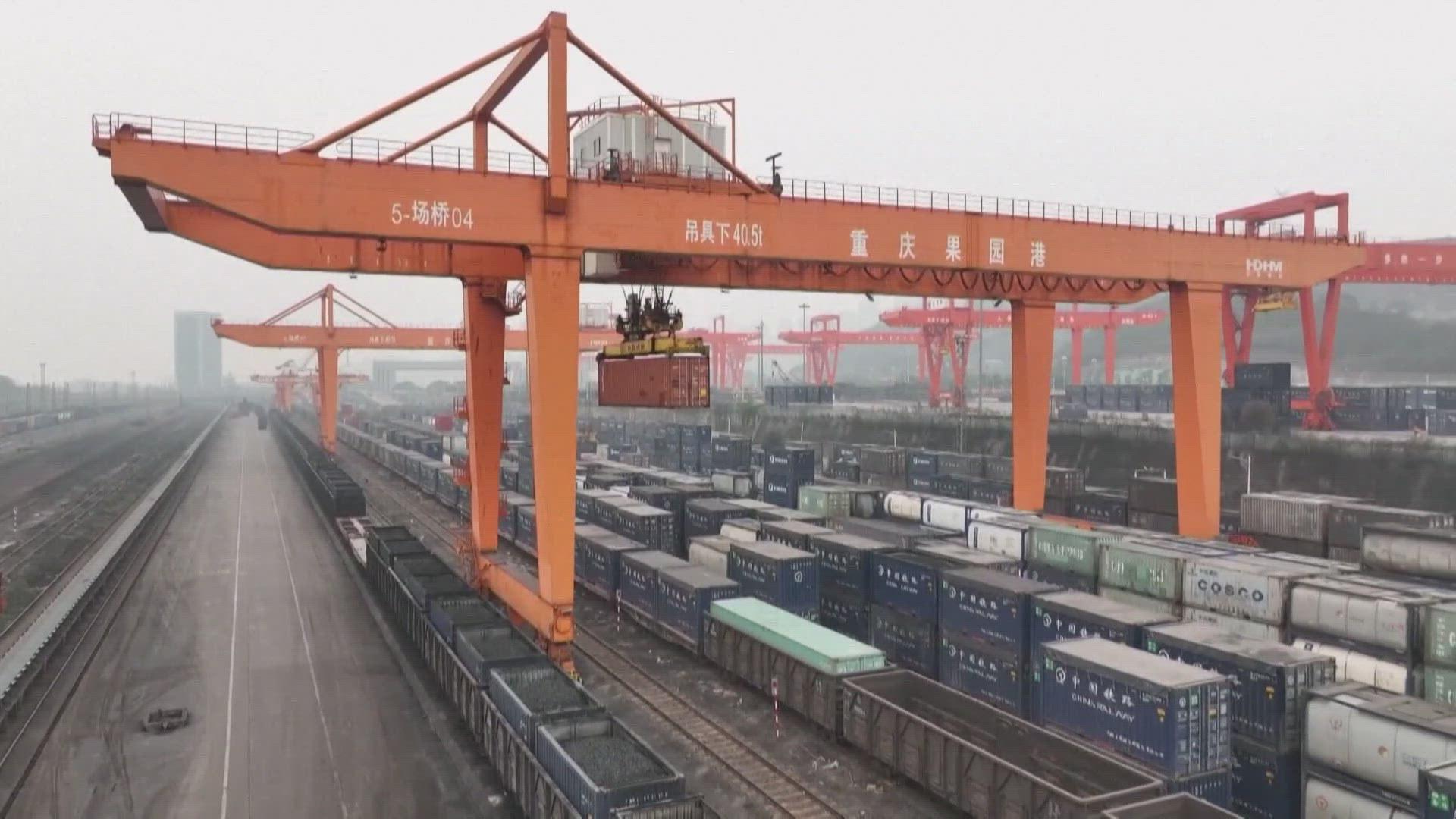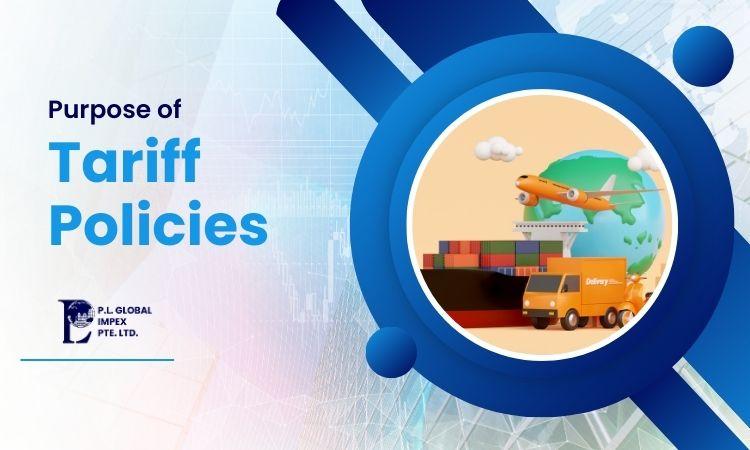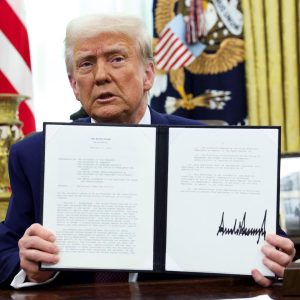In the ever-evolving landscape of U.S. politics, few topics incite as much debate and discussion as trade policies.
In the YouTube video titled “Nicholas Irving on Trump’s tariffs on China, Canada & Mexico; Republicans vs. Democrats (Part 1),” Sergeant Nicholas Irving offers his candid take on President Trump’s controversial tariffs, which have profound implications for both domestic and international relations.
With a mix of humor and introspection, Irving navigates the intricate web of trade, friendship, and economic strategy, dissecting the motivations behind the President’s decisions and the reactions from both sides of the political aisle.
As we dive deeper into this conversation, we will explore not just the ramifications of these tariffs, but also the broader socio-political dynamics at play, shedding light on the challenges and promises that characterize America’s current trade stance.
Buckle up for a thought-provoking discussion that aims to provide clarity in a world of polarized opinions and swift changes.
Understanding the Implications of Trump’s Tariffs on Trade Relations
The imposition of tariffs by the trump governance represents a important shift in trade relations, especially with key partners such as China, Canada, and Mexico. The introduction of a 25% tariff on Chinese imports serves as a direct response to longstanding concerns about unfair trade practices and currency manipulation.
While supporters argue that these measures are essential for protecting American jobs and industries, critics warn that they could lead to increased consumer prices and retaliatory tariffs from affected nations. As the global supply chain is intricately linked, the ramifications of such protectionist policies could ripple through various sectors, creating uncertainty in the market.
moreover, the relationship with Canada—traditionally viewed as a close ally—faces new strains under this tariff regime. The historical partnership has been built on mutual trust and trade cooperation, but the recent sanctions could jeopardize this longstanding bond.
In the case of Mexico, the imposition of tariffs raises questions about the future of the North American Free Trade Agreement (NAFTA) and its potential successor, USMCA.
With economic interests at stake, both Republicans and democrats may need to reconsider their positions on tariffs and trade policy, as the effects become more pronounced. The changing dynamics of these relationships prompt a critical examination of national priorities and the broader implications of economic isolationism.
Analyzing the Political Divide: Republican and Democratic Perspectives on Tariffs

Both Republican and Democratic perspectives on tariffs, especially those implemented by former President Trump, reveal a significant ideological divide.
Republicans generally support these tariffs as a means to protect American industries and domestic jobs, viewing them as a necessary, albeit controversial, measure to reduce trade deficits and counter what they perceive as unfair trade practices by countries like China and Canada.
The viewpoints of Republicans and Democrats on tariffs, particularly those enacted by former President Trump, highlight a notable ideological rift. Republicans typically endorse these tariffs as a strategy to safeguard American industries and jobs, seeing them as an essential, though contentious, approach to diminish trade deficits and address what they consider unfair trade practices from nations such as China and Canada.
They argue that these tariffs could help revitalize manufacturing and lead to a more balanced trade structure.
For instance, a survey among Republicans might show that a majority believes that tariffs can serve as a strategic tool to negotiate better trade deals. Moreover, Trump’s approach aligns with the party’s broader push for an “America First” trade policy, prioritizing the interests of U.S. businesses over global trade norms.
On the other hand, Democrats are more skeptical of the tariff strategy, arguing that such measures can lead to increased costs for consumers and retaliatory actions from trading partners.
They fear that imposing tariffs could disrupt established trade relationships, particularly with allies like Canada and Mexico, possibly harming American farmers and manufacturers reliant on these markets. Discussions within the Democratic Party frequently enough highlight concerns about the impacts on low-income families, as higher tariffs typically result in increased prices for goods.
An analysis might show how Democratic lawmakers emphasize diplomacy and multilateral agreements as a means to address trade issues, creating an surroundings conducive to mutual economic growth rather than escalating tensions through tariffs.
| Perspective | Key Points |
|---|---|
| Republican |
|
| Democratic |
|
Evaluating the Potential Economic Impact on Consumers and Businesses

Implementing tariffs on goods imported from China, Canada, and Mexico could have far-reaching consequences for both consumers and businesses.
As trade regulations shift under these tariffs, consumers may experience increased prices on everyday goods due to the added costs that companies will likely pass on.
For instance, products such as electronics, clothing, and vehicles, which frequently rely on imports, could see significant price hikes. Consequently, the potential burden on consumers may comprise:
- increased Costs: Higher prices for imported goods.
- Inflationary Pressure: Price increases may contribute to overall inflation.
- Limited Choices: A reduction in imported goods may limit available options in the market.
On the flip side, many businesses, especially those involved in manufacturing and exporting, may face challenges adjusting to the new economic landscape.
The imposition of tariffs can disrupt supply chains, limit competitive pricing, and potentially lead to retaliation from trading partners. Smaller businesses, in particular, may struggle to absorb these costs, which could ultimately effect their ability to innovate and remain competitive.
Businesses need to adapt to this evolving scenario, focusing on strategies like:
- Local Sourcing: Rethinking supply chains to minimize dependence on foreign suppliers.
- Price Adjustments: Strategically managing pricing to maintain profitability.
- Market Diversification: Expanding into new markets to mitigate risks associated with changing tariffs.
Strategies for Navigating the Changing Trade Landscape Amidst Tariff Policies

in the current climate of fluctuating trade relationships and tariff implementations, businesses must adapt to survive and thrive. Companies can begin to navigate the changing landscape by assessing their supply chains to identify vulnerabilities.
This could involve diversifying suppliers across multiple countries to mitigate the risks posed by unilateral tariff changes.
Additionally, businesses should keep abreast of legislative developments that may affect trade policies. Engaging with trade experts or utilizing market research can offer valuable insights, enabling informed decision-making in an uncertain environment.
Fostering strong relationships with local partners and exploring new markets becomes essential to maintain competitiveness. Implementing strategic pricing adjustments can definitely help offset increased costs due to tariffs, allowing businesses to stay viable without sacrificing quality or service.
Furthermore, adopting technology-driven solutions can streamline operations and enhance efficiency, reducing dependency on foreign imports. By embracing innovation and adaptability, businesses can not only weather the storm brought on by tariff policies but can also position themselves for growth in an evolving trade landscape.
The Way Forward
the conversation with Sergeant Nicholas Irving delves into the complex terrain of international trade, particularly the impact of Trump’s tariffs on allies like Canada and Mexico as well as the formidable trading partner, China. Irving’s insights provide a unique lens through which to view not only the economic implications of these decisions but also the political landscape that shapes them.
We explored the nuances of Republican versus Democrat ideologies, highlighting how each party perceives the actions of the Trump administration. As we continue to dissect the current political climate and its ramifications on trade relations, its essential to remain informed and engaged.
The repercussions of these tariffs extend beyond mere economics; they resonate deeply within the fabric of our international relationships. We invite you to join us for the next part of this enlightening discussion, where we will further explore the evolving dynamics of U.S. trade policy under differing political leaderships. Thank you for reading and tuning into this conversation about a topic that affects us all.
Your thoughts and opinions are crucial—don’t hesitate to share them in the comments below as we navigate these critical issues together. Stay engaged, stay informed, and we’ll see you next time!

